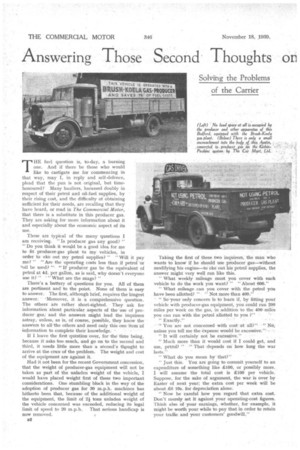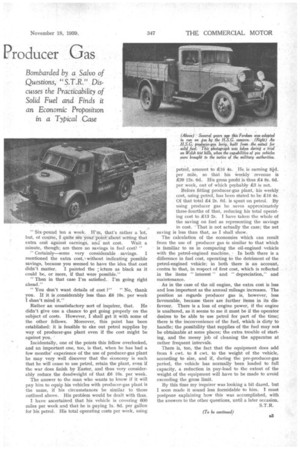Answering Those Second Thoughts on Producer Gas
Page 28

Page 29

If you've noticed an error in this article please click here to report it so we can fix it.
Bombarded by a Salvo of Questions, "S.T.R." Dis. cusses the Practicability of Solid Fuel and Finds it an Economic Proposition in a Typical Case
THE fuel question is, to-day, a burning one. And if there he those who would like to castigate me for commencing in that way, may I, in reply and self-defence, plead that the pun is not original, but time
honoured ? Many hauliers, harassed doubly in respect of their petrol and oil-fuel supplies, by their rising cost, and the difficulty of obtaining sufficient for their needs, are recalling that they
have heard, or read in The Commercial Motor, that there is a substitute in this producer gas.
They are asking for more information about it and especially about the economic aspect of its use.
These are typical of the many questions I am receiving. " Is producer gas, any good? "
"DO you think it would be a good idea for me to fit producer-gas plant to my vehicles, in order to eke out my petrol supplies? " '' Will it pay me?" " Are the operating costs less than if petrol or
'Noll be used? "' If producer gas be the equivalent of petrol at 4d. per gallon, as is said, why doesn't everyone use it? " ' "What are the snags? "
There's a battery of questions for you. All of them are pertinent and to the point. None of them is easy to answer. The first, although brief, requires the longest answer. • 'Moreover, it is a comprehensive question. The others' are rather short-sighted. They ask for information about particular aspects of the use of producer gas, and the answers might lead the inquirers astray, unless, as is, of course, possible, they know the • answers to all the others and need only this one •item of information to complete their knowledge. •
If I leave the first question-over, for the tine being, because it asks too•much, and go on to the second and third, it needs little more than a second's thpught to arrive at the crux of the problem. The weight and cost of the equipment are against it.
Had it not been for the recent Government concession, that the weight of producer-gas equipment will not be taken as part of the unladen weight of the vehicle, I would have placed weight first of these two important considerations. One stumbling Mock in the way of the adoption of producer gas for 30 m.p.h. machines has hitherto been that, because of the additional weight of the equipment, the limit of 21 tons unladen weight of the vehicle concerned was exceeded, reducing its legal limit of speed to 20 m.p.h. That serious handicap is
now removed. Taking the first of these.two inquirers, the man who wants to know if he should use producer gas—without modifying his engine—to eke out his petrol supplies, the answer might very well run like this.
" What weekly mileage must you cover with each vehicle to do the work you want?" "About 600."
" What mileage can you cover with the petrol you have been allotted? " " Not more than 400."
" Scryour only concern is to learn if, by fitting your vehicle with producer-gas equipment, you could run 200 miles per 'week on the gas, in addition to the 400, miles you can run with the petrol allotted to you ?"
" Exactly."
" You are not concerned with cost at " " No, unless you tell me the expense would be excessive" "It will certainly not be excessive."
" Much more than it would cost if I could get, and use, petrol? " " That depends on how long the war lasts."
" What do you mean by that?
" Just this You are going to commit yourself to an expenditure of something like £100, or possibly more. I. will assume the total cost is £100 per vehicle. Suppose, for the sake of argument, the war is over by Easter of next year; the extra cost per week will be about 10s. for depreciation alone.
"Now be careful how you regard that extra cost. Don't merely set it against your operating-cost figures. Think also of your earnings, whether, for example, it might be worth your while to pay that in order to retain your traffic and your customers' goodwill." " Six-pound ten a week. H'm, that's rather a lot, but of course,.I quite see your point :about setting that extra cost against earnings, and not cost. Wait a minute, though; are there no savings in fuel cost? "
'Certainly—sonic very considerable savings. I mentioned the extra cost, without indicating possible savings, because you seemed to have the idea that cost didn't matter. I painted the :icture as black as it could be, or more, if that were possible."
"Then in that case I'm satisfied., I'm going right ahead."
" You don't want details of cost ?" "No, thank yon. If it is',considerably less than £6 10s. per week I shan't mind it."
Rather an unsatisfactory sort of inquirer, that. He didn't give one a chance to get going properly on the subject of costs. However, I shall get it with some of the other fellows. Moreover, this point has been established: it is feasible to eke out petrol supplies by. way of producer-gas plant even if the cost might be against you. ' Incidentally, one of the points this fellow overlooked, and an important one, too, is that, when he has had a few months' experience of the use of producer-gas plant he may very well discover that the economy is such that he will cease to use petrol, retain the plant, even if the war does finish by Easter, and thus very considerably reduce the deadweight of that E6 105. per week.
The answer to the man who wants to know if it will pay him to equip his vehicles with producer-gas plant is the same, if his• circumstances be similar to those outlined above. His problem would be dealt with thus.
have ascertained that his vehicle is covering 600 miles per week and that he is paying is. 8d. per gallon for his petrol. His total operating costs per week, using petrol, amount to £16 4s. He is earning Sid. per mile, so that his weekly revenue is £20 12s. 6d. His gross profit is thus £4 8s. 6d. per week, out of which probably £3. is net.
Before fitting producer-gas plant, his weekly • cost, using petrol, has been stated to be £16 4s. Of that total 24 2s. 6d. is spent on petrol. By using producer gas he saves approximately three-fourths of that, reducing his total operating cost to £18 2s. I have taken the whole of the saving on fuel as representing the savings in cost. ' That is not actually the case; the net saving is less than that, as I shall show.
The calculation of the economies which can result from the use of producer gas is similar to that which is familiar to us in comparing the oil-engined vehicle with the petrol-engined machine. In both there is a difference in fuel cost, operating to the detriment of the petrol-engined vehicle; in both there is an account, contra to that, in respect of first cost, which is reflected in the items " interest " and "depreciation," and maintenance.
As in the case of the oil engine, the extra cost is less and less important as the annual mileage increases. The position as regards producer gas is, however, less favourable, because there are further items in its disfavour. There is a loss of engine power, if the engine is unaltered, as it seems to. me it must be if the operator desires to be able to use petrol for part of the time; there is the inconvenience of the fuel, which is dirty to handle; the possibility that supplies of the fuel may no be obtainable at some places; the extra trouble of starting, and the messy job of cleaning the apparatus at rather frequent intervals.
There is, too, the fact that the equipment does add from 5 cwt. to 8 cwt. to the weight of the vehicle, according to size, and if, during the pre-producer-gas period, the vehicle has normally been loaded to full capacity, a reduction in pay-load to the extent of the weight of the equipment will have to be made to avoid exceeding the gross limit.
By this time my inquirer was looking a bit dazed, but I soon made it sound less formidable to him. I must postpone explaining how this was accomplished, with the answers to the other questions, until a later occasion.
S.T.R.




























































